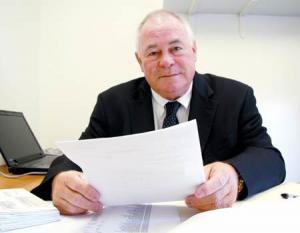When Bill Brown was pulling long hours as the chief financial officer for the City of Baltimore, he decided to try something new: painting. He bought canvases and tubes of oil paints.
“I painted at night, to kill time,” he said. “The only one I had to please was myself.” More recently, his talents are pleasing more than a few officials in Dewey Beach, where he was recently hired as chief financial officer.
“He’s getting his arms wrapped around everything now,” said Town Manager Diana Smith. “He’s doing great – he’s a good fit, a very good fit here.”
On a sweltering July morning, Brown still wore a blue blazer and tie. His office was spartan, hardly moved into: a laptop, calculator, a small stack of bills and a tube of Clorox wipes were all that adorned his desk.
He used to be retired, he said. It got old.
“You do this, you do that, and the next thing you know, you’re watching TV too much,” he said.
Brown spent 41 years managing money, starting in private industry but spending the majority of his career in civil service.
He graduated from Strayer University in 1961 with degrees in accounting and financial administration. He then worked at Pepco, a Washington, D.C.-area electric company, holding positions in accounting and auditing before taking a position with Prince George’s County, Md.
It was a different kind of job, he said. Numbers weren’t abstract figures – they had real implications for real people.
“When you work for the public sector, you’re closer to the people,” he said. “Your motivations are different.”
He started in public works before taking a job with the county auditor. Eventually, the county administration asked him to become director of finance, a position he held for 13 years.
The position allowed him leeway to do things his way.
“In local government, you get to accomplish things,” he said. “You have an opportunity to make changes and be creative.”
After 23 years in Prince George’s County, he took a position in Baltimore. When he came on as director of finance in November 1989, the troubled city had 20,000 employees and a dangerously slim budget surplus of $32,000. In the early days, he said, he woke up in cold sweats. Brown was no novice, but Baltimore was a monumental challenge.
He spent a decade working for Kurt Schmoke, Baltimore’s first black mayor. He bought computers, monitored debt and managed risk.
He processed paychecks for the city’s employees. After years of hard work, Brown had nurtured the city’s sickly balance into a $60 million surplus.
“The most important thing was getting good department heads working for you,” he said. With people he could depend on and a recovering account balance, the night sweats stopped. He started painting.
“We had good, professional people,” he said. “In any job for me, the big motivator is the people I work with. It’s like a second family.”
Brown left Baltimore when Schmoke left office. He worked for Anne Arundel County, Md., as controller for eight years before leaving public service. He and his wife had a house at the beach, he said, and he intended to enjoy it.
In January 2009, Brown commenced his well-earned retirement.
He painted, went for swims – good exercise, he said – and listened to National Public Radio. He lasted a year and a half.
“I was itching to get back to work,” he said with a wry smile. He saw an advertisement for a open position in Dewey Beach – the town was looking for a chief financial officer, someone with accounting experience and preferably a background in public service.
Smith said she was floored by his resume. “I thought, wow, this guy’s got great governmental experience,” she said. “He had the background. He has the know-how of the difference between private accounting and public accounting.”
He got the job. Now he’s in charge of producing profit-and-loss reports, managing investments and working with the town government.
It’s a back-to-basics job for the man who once commanded a budget of many millions of dollars, but Brown said he likes it. It’s about the people, he said, and they’re as good in Dewey as anywhere.
“I’m impressed by the folks I’ve met,” he said. “They’re very nice, very sincere.”
It’s also nice to have a little bit of a cash cushion, he said. The $350,000 budget surplus from calendar year 2009 gives him peace of mind as he settles into the position. While he enjoys the creative leverage of leadership, he said he doesn’t plan on shaking up Dewey’s procedures quite yet.
“The worst thing you can do is get in a place and start changing things right away,” he said. “A cautious approach is better.”
He’s still painting, he said. He’s even taking classes at Wilmington University. While he throws out most of his canvases – “Got to make space, you know?” he said – he’s kept a few. His imagination was captured by the sight of a navigational buoy washed ashore at Delaware Seashore State Park after the nor’easters of autumn 2009. “I thought, this is a once-in-a-lifetime thing! I’m going to have to paint that,” he said.
His favorite painting is from his Baltimore period: a couple sitting at a table in a café, drinking a bottle of champagne, enjoying each other’s company. They seem relaxed, carefree – almost as if they’re retired.






















































